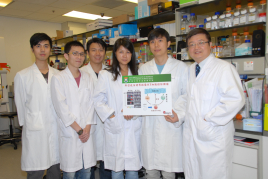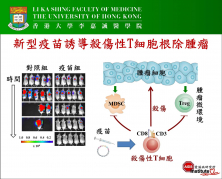Media
HKU discovers a new mechanism of killer T cells in elimination of cancer
26 Aug 2014
Eradicating malignant cancer cells by vaccine-elicited host immunity remains a major medical challenge. The reason behind the challenge is largely due to the lack of effective vaccination to induce immune surveillance, which requires a large number of functional killer T cells to eliminate malignant cancer cells. Researchers from Li Ka Shing Faculty of Medicine, The University of Hong Kong (HKU) present findings of a 5-year study that an effective vaccine can actually harness the immune system and reinstate immune surveillance by overcoming tumor-associated immunosuppressive environment. The discovery, recently published in the international prestigious journal, Cancer Research, is important for understanding cancer immunotherapy.
Research Implications
Professor Chen Zhiwei, Director of the AIDS Institute and Professor of Department of Microbiology Li Ka Shing Faculty of Medicine, HKU, who led the study, points out that the discovery has provided new insights into quantitative and qualitative requirements of vaccine-elicited functional killer T cells in cancer prevention and immunotherapy. “The discovery will encourage researchers to explore new ways of active vaccination for the development of both preventive and therapeutic strategies against cancer.” Another researcher of the study, Professor Yuen Kwok-yung, Henry Fok Professor in Infectious Diseases and Chair Professor of Department of Microbiology, Li Ka Shing Faculty of Medicine of HKU adds, “This study demonstrated that a novel vaccination strategy initially invented for fighting AIDS virus is quite helpful to the search of an effective cancer immunotherapy.”
Background of the study
The activation of oncogenes induces malignant cancer cells while renders them vulnerable to anti-tumor immune defense cells such as killer T cells. When host immune system fails to eliminate cancer cells in time, they may hijack ineffective immune responses to foster the growth and progression of cancer. On one hand, cancer cells express inhibitory molecules on their surface to dysregulate killer T cell function. On the other hand, the growing cancer evades killer T cells by sustaining immunosuppressive cells especially in the tumor microenvironment. To date, few vaccine strategies can overcome tumor-associated immunosuppressive microenvironment even in small animal model system.
The present study focused on malignant mesothelioma that is thoracic and often incurable. Patients often die within one year after diagnosis. The major risk factor of human mesothelioma is the occupational exposure to asbestos from mining and construction work. As one of the world’s largest producers of asbestos, it is estimated that China including Hong Kong is facing the incidence peak in recent years.
Research method and findings
In the current study, the team developed a quantitative model of malignant mesothelioma in over hundreds of immunocompetent mice, which allows the efficacy testing of a novel PD-1-based DNA vaccine. We found that repeated PD-1-DNA vaccinations by four times, a major advantage over live-vectored vaccines with issues of pre-existing immunity, remained highly effective in tumor-bearing animals and led to therapeutic cure of pre-existing malignant mesothelioma. Vaccine-induced killer T cells functioned by releasing inflammatory IFN-γ and TNF-α in the vicinity of target cells as well as by initiating TRAIL-directed tumor cell apoptosis. The vaccinations achieve an active functional state not only preventing the rise of functionally exhausted killer T cells but also overcoming tumor-induced immunosuppressive cells, with the frequency of antigen-specific killer T cells inversely correlating with tumor mass.
About the research team
The research team was led by Professor Chen Zhiwei, Director of the AIDS Institute and Professor of Department of Microbiology, Li Ka Shing Faculty of Medicine, HKU. Other researchers include Professor Yuen Kwok-yung, Henry Fok Professor in Infectious Diseases and Chair Professor of Department of Microbiology, Li Ka Shing Faculty of Medicine of HKU, Professor K Man of Department of Surgery, Dr Zhiwu Tan, Dr Li Liu, Dr Jingying Zhou, Dr Allen Cheung, Dr Zhe Yu, Dr KW Cheung, Dr JG Liang, Dr HB Wang and Mr BK Lee of the AIDS Institute. The study was funded by grants from Hong Kong Pneumoconiosis Compensation Fund Board, Hong Kong Research Grants Council, as well as HKU-UDF and HKU LKSFM matching fund.
Please visit the website at http://www.med.hku.hk/v1/news-and-events/press-releases/ for press photos.
(From Left to Right) Dr Allen Cheung, Mr BK Lee, Dr KW Cheung, Dr Li Liu, Dr Zhiwu Tan of the AIDS Institute and Professor Chen Zhiwei, Director of the AIDS Institute and Professor of Department of Microbiology, Li Ka Shing Faculty of Medicine, HKU.


